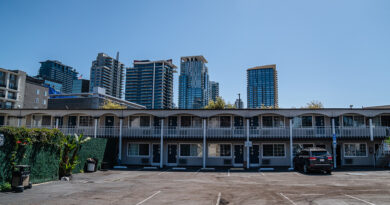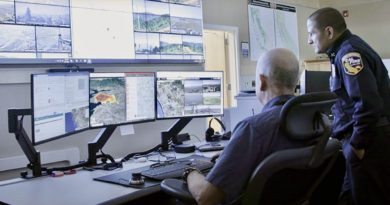Daily Business Report-July 24, 2015
San Diego State physics professor Matt Anderson lectures from behind the ‘Learning Glass.’
Illumination in Education
SDSU’s Matt Anderson is changing the face of online learning
By Hallie Jacobs
Is it magic? Or is it physics in action?
Matt Anderson, a physics professor at San Diego State University, together with a team of engineers from SDSU’s Instructional Technology Services are defying instructional norms with the introduction of a unique learning tool.
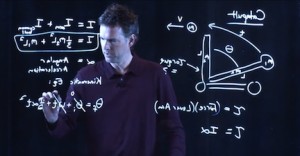
The innovation — dubbed Learning Glass — is an LED-lit glass board that faculty can use to write on or project PowerPoints and video, while maintaining eye contact with their students.
The creation of the Learning Glass was spawned by Anderson’s dissatisfaction with traditional online learning. As an instructor who embraces the shift toward online classes, Anderson was uninspired by the current standard of online learning, which typically consists of a PowerPoint with a voiceover from a professor.
“Online class structures always seemed really boring to me,” Anderson said. “I started working video into my online classes, but I was writing on a board with my back to the students. I wanted to find a way to maintain face-to-face contact with students.”
Thus Learning Glass was born.
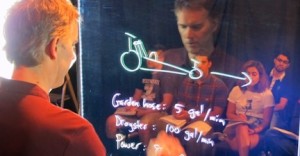
With funds from an SDSU President’s Leadership Fund grant, Anderson used side lighting on low-iron shower glass to create a see-through “white” board. This allows neon dry-erase markers to become highly visible.
Students are able to observe the nuances of problem-solving as their professor teaches while facing them. With a horizontal “flip” of the image, Learning Glass has the visible presence of a whiteboard.
Technology and education
Though the innovation is high-tech, Anderson stresses that it is very similar to traditional chalkboard instruction.
“If you’re a traditional lecturer — as in someone who uses a chalk or whiteboard — using Learning Glass isn’t that different,” Anderson said.
“We need chalk and whiteboard, particularly in fields such as mathematics and physics, to work out problems, and as students, they need to follow along. Here’s a way you can do that with no more difficultly than delivering a traditional lecture because the technology does the image-flipping for you.”
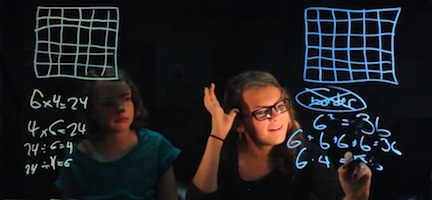
Learning Glass technology is available to both students and faculty through a studio set up on campus.
“When designing online learning, a main goal is to use a mix of synchronous and asynchronous tools and techniques to maximize interaction and student engagement,” said James Frazee, SDSU’s senior academic technology officer and director of ITS. “Learning Glass supports this goal by humanizing the experience.”
San Diego’s Bad Roads Cost Average
Motorist $800 in Annual Vehicle Expenses
10 News
More than half of the roads in the San Diego area are in poor condition, costing the average motorist more than $800 in annual vehicle expenses, according to a study released Thursday.
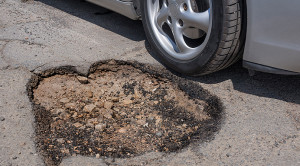
The San Diego area was ranked eighth-worst in the nation in terms of bad roads, with 51 percent considered to be in poor condition, according to the study by TRIP, a Washington, D.C.-based transportation research group. The area placed ninth for additional costs to motorists due to bad roads, at an annual average of $843.
The San Francisco/Oakland area was ranked worth in both areas, with 74 percent of roads in bad condition, costing motorists $1,044 a year. The Los Angeles/Long Beach/Santa Ana region was second-worst, with 73 percent of roads in bad condition, costing the average motorist $1,031 a year in expenses such as vehicle deterioration and depreciation, increased maintenance, fuel consumption and tire wear.
The Riverside-San Bernardino area placed 14th worst with 46 percent of roads in poor condition, and 12th worst in terms of annual cost to motorists, at $812 a year.
Jill Ingrassia of the American Automobile Association said the rough roads “stress nerves and cost billions in unnecessary vehicle replacement, repair and fuel costs.”
“Full investment in our nation’s transportation system will reduce the financial burden on drivers and provide them with a smoother, safer and more efficient ride,” she said.
A little over two weeks ago, the city of San Diego began a $74 million effort to fix 300 miles of roadways during this fiscal year. Mayor Kevin Faulconer set a goal of repairing 1,000 miles of streets over the next five years.
According to data provided by the city, around 175 miles of roads were repaved or slurry-sealed in five of the previous seven fiscal years.
The city is also conducting its own assessment of street conditions, with results due in December.

Patent and Trademark Office Grants Trademark
To Producer of Salt Lake Comic Con
The United States Patent and Trademark Office has granted Dan Farr Productions the trademark for the name Salt Lake Comic Con, according to the producer of the annual show in Salt Lake City, Utah.
The trademark ruling comes almost a year after San Diego Comic-Con International first sent Salt Lake Comic Con a cease and desist letter demanding that Dan Farr Productions stop using the term “comic con” in their name. The cease and desist letter set off a lawsuit and countersuit that was, until this point, heading to trial.
The trademark was issued on July 14 and is for: “Education and entertainment services, namely, organizing, producing, and conducting conventions in the fields of gaming, comics, television, movies, technology, science fiction, fantasy, and popular culture for entertainment purposes.”
The trademark specifies that no claim is made to the exclusive right to use “comic con” apart from the mark as shown
“We’re confident that this decision from the USTPO will virtually eliminate this ongoing legal battle and allow us to prepare for another record-breaking show this September,” said Bryan Brandenburg, Salt Lake Comic Con co-founder and chief marketing officer. “By granting us a trademark for ‘Salt Lake Comic Con’, the trademark office is literally declaring our right to not only use comic con in our name, but that we are distinguished in the marketplace. It further declares that San Diego’s trademarked name is not ‘confusingly similar’ to our trademarked name, which is the nexus of the lawsuit.”
Salt Lake Comic Con 2015 is scheduled for Sept. 24-26, 2015 at the Salt Palace Convention Center in downtown Salt Lake City. Its producer claims it is the third largest comic con in the country.

San Diego Company Named a Winner
Of GE and NFL Head Health Challenge
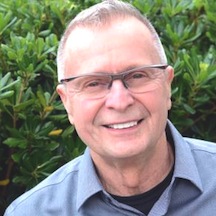
Banyan Biomarkers Inc. of San Diego has been named one of six winners of the $10 million Head Health Challenge, a competition sponsored by GE and the National Football League to improve the safety of athletes, members of the military and society.
Each winner will receive a $500,000 award to advance their work to speed diagnosis and improve treatment for mild traumatic brain injury. The award is in addition to $300,000 previously awarded to the 16 first round winners of the Head Health Challenge I.
Banyan Biomarkers is developing a point-of-care blood test to rapidly detect the presence of mild and moderate brain trauma to improve the medical management of head injured patients. Researchers from Banyan Biomarkers and the University of Florida are collaborating on a sports concussion study to analyze biomarkers, neurocognitive testing, and neuroimaging on student athletes.
The company expects 20 blood-based markers for head injury will be added to the study in the coming year which will help provide researchers a better understanding of the biochemical pathways that occur in the brain after a concussion and, ultimately, assist to develop treatments to improve clinical outcomes.
“We are truly impressed by the quality of the work and the measurable progress being made by these winning organizations,” said Alan Gilbert, spokesman for GE. “There are a number of breakthrough ideas that are advancing our understanding of the brain and have applications not only on the playing field but also extend to neurodegenerative diseases such as ALS, Parkinson’s and Alzheimer’s.”
Illumina Shares Fall Despite
119% Growth in Quarterly Profit
Times of San Diego
San Diego-based Illumina reported a 119 percent increase in earnings for its second fiscal quarter, but the results disappointed analysts and the company’s shares fell Wednesday.
The maker of gene-sequencing equipment reported earnings of $102.2 million, or 69 cents per share, in the quarter ended June 28, a 119 percent increase over the $46.6 million, or 31 cents per share, recorded in the year-ago quarter. Revenue of $539.4 million was 21 percent higher than the $448.6 million of a year ago.
“We delivered solid financial results in the second quarter with increasing demand for our new products,” said CEO Jay Flatley. “The fundamentals of our business are strong and we remain focused on innovation and market expansion.”
Stock market analysts polled by Thomsom Reuters had expected earnings of 77 cents per share per share on revenues of $542 million.
Illumina shares closed at $217.49 on Wednesday, down from $237.54 on Tuesday just before the earnings were released.
The company updated its forecast for the entire fiscal year, projects 20 percent and annual earnings per share of $3.39 to $3.45.
Low-Level Offenders Log Record
5,000 Hours Of Community Service
San Diego neighborhoods have benefitted from more than 5,000 hours of community service under a program that allows people who commit low-level crimes to avoid a criminal record and jail by giving back to their community.
The milestone was achieved earlier this month by participants in the San Diego Community Court Program, a pilot program launched by the City Attorney’s Office in partnership with the Sheriff’s Department, Public Defender’s Office and two social-service organizations, Alpha Project and the Urban Corps of San Diego County.
The program allows offenders who are charged with low-level misdemeanors to pay their debt to society through service programs that have included planting trees, recycling waste, painting out graffiti, clearing neighborhoods of illegally dumped trash and providing services to the homeless.
Once the conditions are met, the case is dismissed without the participant returning to court and the charge never appears on the participant’s record.
To date, the City Attorney’s Office has made Community Court offers to 558 people, generally young and first-time offenders. Of the 558 offers, 398 (64 percent) were accepted.
Of the 398 individuals who accepted offers, 321 (81 percent) successfully completed the 16 hours of community service and other conditions of the program. The remaining 77 failed to complete the conditions within 90 days. Under the program’s terms, they are then sentenced to time in custody. Bench warrants are issued for any who do not return to court for sentencing.
City Attorney Jan Goldsmith said the program is expected to save the courts millions of dollars this year.
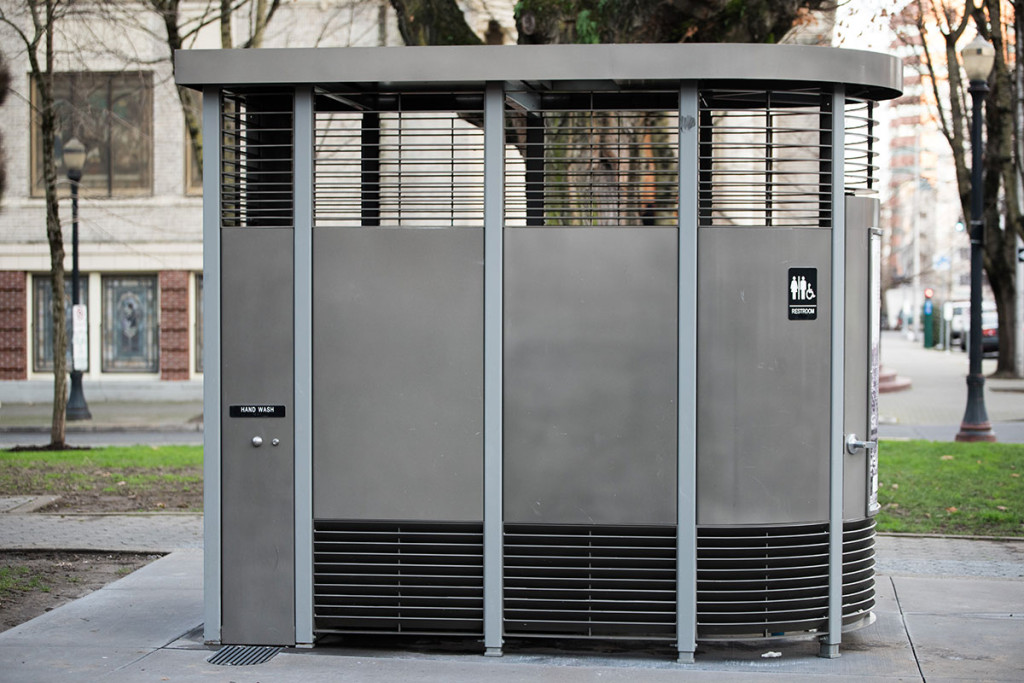
City Mulls Removing East Village
Restroom Used by the Homeless
City News Service
City staff is recommending removal of one of two public restrooms installed in the East Village section of San Diego for use by the area’s homeless.
The proposal to take out a so-called “Portland Loo” located at 14th and L streets is scheduled to be made next Wednesday at a meeting of the City Council’s Public Safety and Livable Neighborhoods Committee. At the same meeting, the committee members will consider a response to a county grand jury report that says the Downtown area has far too few public restrooms.
The prefabricated metal structure and another like it at Park Boulevard and Market Street were installed in December and January in an effort to improve health and safety in the area. Transients live in the neighborhood alongside residents of expensive condominiums built over the past 15 years, baseball fans going to and from Petco Park, and patrons of the new Central Library.
According to a memo from city Chief Operating Officer Scott Chadwick, police were called to the restroom at 14th and L streets 25 times between April and June, compared to 11 times in the same period last year — before the facility was installed. Calls at the other one climbed from 32 to 58.
He said the calls generally were for disturbing the peace.
The 14th and L restroom required repairs at double the rate of the one at Park and Market, staff said.
“The Portland Loos have been in place for more than six months and the complaints and issues have not diminished for the site located at 14th and L,” Chadwick wrote. “As such, staff feels that it may be appropriate to remove the Portland Loo at this location and store the facility while staff continues to look for another location for the public’s use.”
He said he’s not yet recommending removal of the Portland Loo at Park and
Coastal Commission Delays SeaWorld Hearing
The California Coastal Commission has postponed a hearing on a $100 million proposal to expand SeaWorld’s orca habitat to the fall because it’s been inundated with comments. It’s received roughly 50,000 letters and emails, most in opposition.
USS Gary Decommissioned at Naval Base San Diego
City News Service
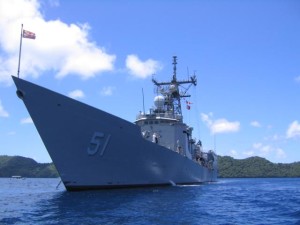
The last frigate on the West Coast was decommissioned Thursday at Naval Base San Diego at a ceremony attended by former commanders and crew.
The USS Gary returned to San Diego in April from its final deployment, in which it patrolled for drug smugglers off Central America.
The Navy is retiring its frigate fleet in favor of more modern littoral combat ships, which are designed for combat in coastal waters. The last frigate to be decommissioned will be the Norfolk, Virginia-based USS Kauffman later this year.
The ship is named for Donald Arthur Gary, who was awarded the Medal of Honor for helping to rescue hundreds of sailors trapped below decks when the aircraft carrier USS Franklin was badly damaged after being bombed off the coast of Japan in March 1945.


